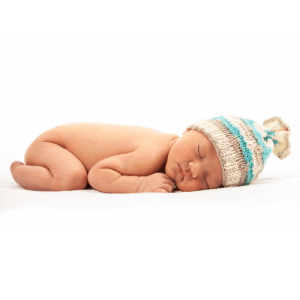
What is a sleep association? A sleep association is an external source that takes you or your child from an alert and engaged state into a state of calm to the point of sleepiness or falling asleep. A sleep association helps your heart beat more slowly and for your breathing to slow down as well.
There are so many sleep associations: nursing, holding, pacifier, motion, bouncing, white noise…and a whole combo of these. I do not call sleep associations good or bad IF it is working for your family. What calms someone is not necessarily bad unless it is harming their health, or harmful to one’s health in the long term. I do not like the terms “negative sleep association” or “sleep crutch” as those give such a negative connotation on something that is actually just one way a little one calms down.
When babies are born they are not able to calm themselves. “Sleep crutches” or “sleep associations” are a huge blessing for many families, especially in the early months when babies are not yet able to self-soothe. The ability to self-sooth involves promoting effective connections between the structures of the limbic system and the cortex in a child’s brain;1
during infancy not enough of these connections have been made, which is why we can’t expect babies to calm themselves as infants. These little ones NEED the help of parents or other associations to become calm and sleep (which includes falling back to sleep).
“Doing what works” when it comes to sleep should not be a source of guilt for any parent, especially when you are caring for an infant. Parents usually get into a rhythm that feels good to the parent and baby, and during that time parents learn what babies respond well to and what they don’t respond well to. This is a beautiful exchange that happens within a parent/child relationship.
In fact, sleep associations are often not only calming for babies but can also be calming for parents:
“Parent–infant synchrony is charted in its development across infancy from the initial consolidation of biological rhythms during pregnancy to the emergence of symbolic exchange between parent and child. Synchrony is shown to depend on physiological mechanisms supporting bond formation in mammals—particularly physiological oscillators and neuroendocrine systems such as those involving the hormone oxytocin.”
– Parent-Infant Synchrony: Biological Foundation and Developmental Outcomes2
Nursing or holding your baby to sleep, or being able to calm your baby in general, is part of that beautiful synchrony that a parent and baby share from the beginning.
Having said all of this, helping your baby fall asleep isn’t all rainbows and roses. Before your baby turns 4 months old, your baby is basically jetlagged as he or she is getting used to life outside of the womb. Around 4 months old, baby’s night sleep begins to look more like adult sleep as they begin to experience sleep cycles.3
Babies wake up during the night primarily because their brain waves transfer and change cycles as they move from REM (rapid eye movement) sleep to other stages of non-REM sleep.4
It is completely natural and healthy for babies to wake at night. Waking between cycles of deep (non-REM sleep) and REM sleep on top of bursts of cognitive awareness can cause very wakeful nights for both parents and baby during these early months.
A baby will have the majority of his/her deep sleep at the beginning of the night (which is why they usually have the longest stretch of sleep towards the early part of the night (typically around 2 hours). After that, a baby will have shorter spurts of deep sleep which then becomes cycles of non-REM sleep and light non-rem towards the end of the night – so, frequent wakings after the first part of the night are common.5
Unfortunately, not all of us have night nurses or grandmas who can stay with us to help us get restorative sleep ourselves (if you have the ability to hire help or ask a family member, you should! I will link a couple night nanny sources for you at the end of this blog). And not every parent feels right about bed-sharing. Even when bed-sharing it doesn’t help a whole lot with a baby who wakes every 45-90min to be comforted back to sleep.
By the time babies turn around 6 months old or older (adjusted), the ability to self-regulate has begun to develop6
– thanks to all of the co-regulating parents have done up to that point. Because self-regulating abilities have begun to develop, shifting, or gradually removing, a sleep association may be successful at this time and is usually not too much to ask of children 6 months or older.7
I will mention that parents should not leave babies to cry it out because connections between the limbic system and cortex continue to be made up until the pre-school years – and even then, we all need help regulating at times; responding and being a calming force when your child is distressed is still very necessary and important.
I will finish with this: I love what dr. Sears has to say about weaning a child and I personally see many correlations between breastfeeding and helping a little one fall asleep…
“Weaning is not a negative term, nor is it something that you do to a child. Weaning is a journey from one relationship to another. The Hebrew word for wean is gamal, meaning ‘to ripen.’ In ancient times, when children were breastfed until two or three years of age, it was a joyous occasion when a child weaned. It meant the child was filled with the basic tools of the earlier stages of development and secure and ready to enter the next stage of development…..While we advocate extended breastfeeding that comes to a natural end when the child is ready, we realize this ideal is not always attainable in every family situation. Breastfeeding is meant to be a pleasurable experience. When one or both members of the mother-infant pair aren’t enjoying it anymore, it’s time to wean. After all, all good things must come to a timely end.”
– Dr. William Sears8
Breastfeeding is a relationship between the child and mother; and in my mind, so is helping your baby back to sleep. When it is not working for one or both of you, AND your child is old enough to shift from a sleep association, there shouldn’t be any guilt.
Shifting sleep associations can often be done gently and sensitively. How, you may ask? Please join me for my free webinar on “3 things you need to know to sleep train your child successfully” to learn more!
Night Nanny Services in the Gallatin Valley area: https://www.treeoflifedoulacare.com/
Night Nanny Services elsewhere: https://www.letmommysleep.com/

Sleep

Sleep
